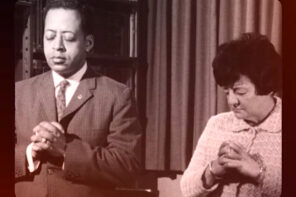Tshuvah—the Jewish process of self-reflection and return (usually translated as “repentance”), has long been fraught with ambivalence for many LGBT people. Set aside the fact that on the Day of Atonement itself, the ur-text of Jewish homophobia, Leviticus 18, is read from the lectern in traditional congregations. The whole trajectory of Jewish repentance can be problematic. Feel guilty over misdeeds. Feel judged. Feel inadequate. Many gay people have worked for years not to feel this way. And yet on Yom Kippur, it’s part of the point.
The process of gay self-acceptance is one of building self-confidence. The process of tshuvah is one of self-questioning.
And more than that: as we review our “misdeeds,” it’s inevitable that long-ingrained feelings of unworthiness and homophobia will surface. Those of us who were taught homophobia as children can’t just wish it away through therapy and liberation. It contaminates the ‘repentance’ process for years.
And more than that: as we have seen in our political moment, the central principle of tshuvah, that change is possible, is used as a weapon against sexual minorities. The desire to change—fundamental to tshuvah—is, when applied to homosexuality, unhealthy. For our community, “change” is a code word for repression, distortion, and fear.
So LGBT people must either abandon repentance or queer it. If we are not to reject it, we must make it our own, make it more complex, set aside its oversimplifications. The good news is that this is a gift to everybody else.
Total surrender to heteronomous ethics is unhealthy, period. It may be prescribed by some, but it is also what leads to fundamentalism and religious violence. Gay people know this firsthand: to love oneself as a religious queer person requires interposing one’s own experience between oneself and the text. The text in its traditional reading cannot be correct, because it is incompatible with a notion of a loving God. But that truth is only known by allowing experience, conscience, and discernment to speak.
“I Guess I’ll Go to Hell, Then.”
The situation religious many queers face is like that faced by Huck Finn in Mark Twain’s novel. Huck has been taught that if he helps escaped slaves, he will go to hell. But he has befriended Jim, the runaway slave, and cannot turn him in. So, Huck decides at a pivotal moment in the book, “I guess I’ll go to hell, then.” That moment, of course, is not damnation but salvation. It is the birth of a mature conscience.
Gays and lesbians born into religious communities all each face a Huck Finn moment, at which the comforting immaturity of dogma yields to a more complicated, but ultimately redemptive, moral conscience. It is a big deal. For those who reject religion, it may often mean severing ties with family or renouncing a connection that was once beloved. For those who reject their independent desires and side with religion, it means a lifetime of repression and sublimation. And for those who refuse to choose between God and gay, it means having to do just what Huck Finn did: transcend religion in order to save it.
Of course, this is an essential step for all religious people—but it’s one LGBT religious people cannot avoid. Queer spiritual consciousness is inherently distrustful because it has seen how rules, codes, and even the operation of conscience itself can be tools of oppression and self-repression. Of course, straight people ought to come to this realization also. But religious queer people have to.
Yet once we have had our moments, done the work, and cultivated the mistrust, what is next? If it is not libertinism, then what is to be our guide? How do we tell guilt apart from conscience? And how do we tell sincere affirmation apart from mere preference?
Some people say that the truth is what we feel “deep down.” I disagree. I disagree with this entire geology of the self, which is an illusion, and which is factually incorrect. What’s called “deep down” is just a feeling that accompanies certain ideas, usually those one has held the longest. It’s not an indication of truth—just of endurance.
The facile belief that “your conscience should be your guide” is simply not true. Your conscience is a social construct, and the feeling of truth may be merely the feeling of a belief held for a long time. If you’re raised not to eat pork, the simple act of eating can induce a feeling of guilt “deep down,” even if one has long ago ceased to keep kosher. Guilt has nothing to do with substantive merit—as gay people know all too well. The emotive response of guilt remains long after the mind, heart, and spirit have all reconciled themselves to the reality of sexual expression, and of love. Honest and nourishing sexual expression brings us to love, to truth, to holiness. Guilt knows none of this.
Moreover, guilt is a conditioned phenomenon like everything else. It isn’t a still-small voice; it’s mechanistic. It’s a meme, installed by years of repetition, that has no particular value one way or the other.
No Substitute for Discernment
In place of these artificial geologies of the self, I have found it more productive to employ the faculty of discernment, and inquire into the present sensations of a given moral choice. When I am acting in accord with my body, mind, and heart, there is a sense of groundedness, of peace, that arises. When I’m just indulging a preference, there may be a pleasant sense of lust, but it’s not integrated; it’s ungrounded.
Unlike the sense of groundedness that is attachment, that so closely resembles guilt, and that is tied to specific norms and behaviors, there is a form of resting in consciousness itself, and in a mode of consciousness that is ever-present. The phrase “resting in the present moment” carries a slight whiff of the New Age, but what it means is that the mind has been practiced-upon enough that it can stop worrying, stop thinking so many thoughts, and stop rewinding and fast-forwarding through time. And, as such, it allows a wider, deeper journey to unfold. Objections, moral reasoning, pros and cons can be seen and held clearly. The body itself can convey messages of “works for me” or “doesn’t work.” The operations of conscience can proceed.
There is no substitute for discernment. Not surrender to a text, nor zeal, nor the illusions of the “deep down.” Only the hard work of spiritual practice (meditation, contemplation, contemplative prayer, yoga, etc) to untangle the mind and try to see one’s values and one’s actions clearly. It’s not that everything is okay and all is permitted. It’s that the only way to sort wheat from chaff is to do so carefully, in a calm and composed mind, at once informed by sacred traditions and yet almost, it seems, from scratch.




